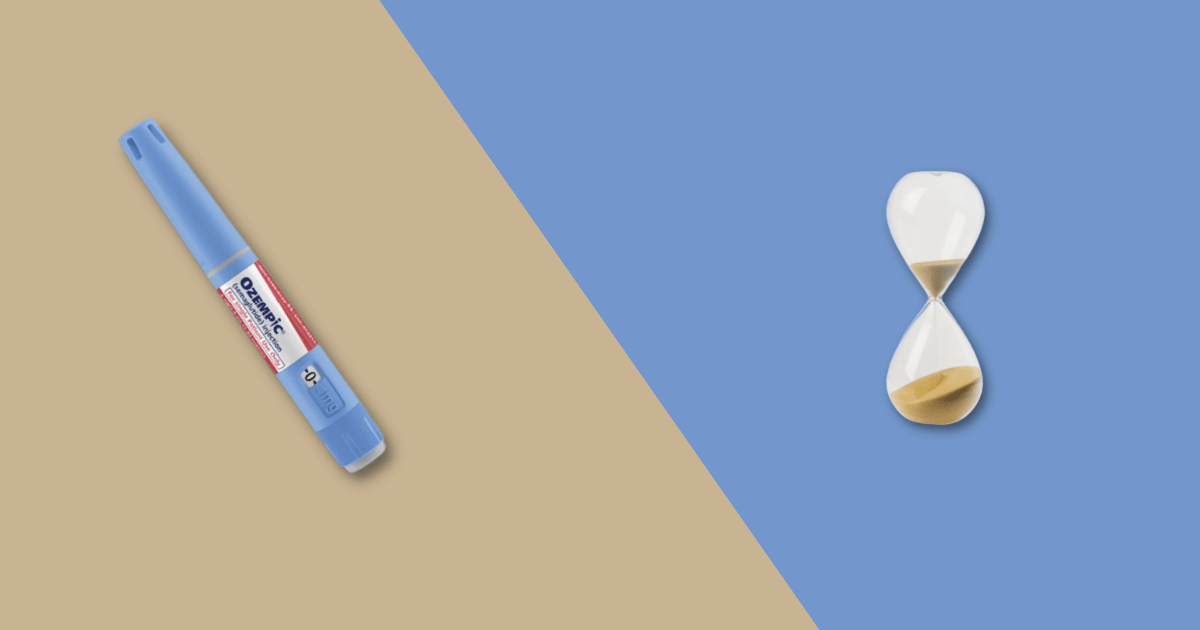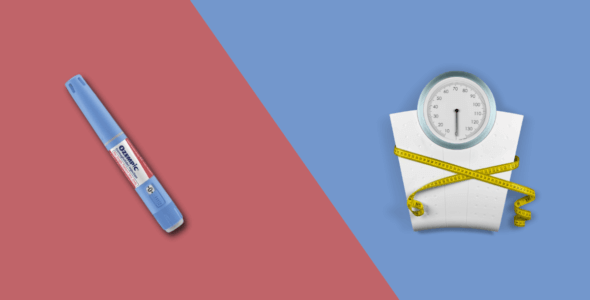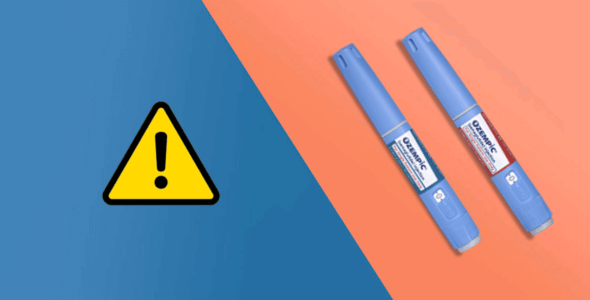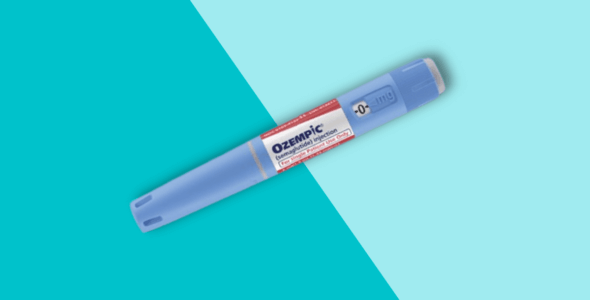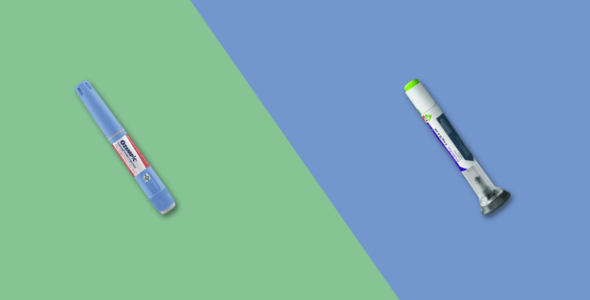How long does Ozempic stay in your system?
Table of contents
- What is Ozempic?
- What is Ozempic used for?
- How does Ozempic work?
- How long does it take for Ozempic to work?
- How long does it take for Ozempic to suppress appetite?
- Do you regain weight after stopping Ozempic?
- How long does it take for Ozempic to get into your system?
- How long does Ozempic stay in your system?
- How long does it take for the effects of Ozempic to wear off?
- When should I stop Ozempic?
- What happens if you stop using Ozempic?
- What are the side effects of Ozempic?
- How long do Ozempic side effects last?
- Does Ozempic have long-term effects?
- What are the risks of long-term use of Ozempic?
- How do I take Ozempic?
Type 2 diabetes affects over 6% of the population, causing people suffering from this condition to be more susceptible to other health risk factors such as kidney and heart disease.
Ozempic is still a relatively new treatment for diabetes, but its use is growing fast with more people across the world using it every day. In this article, we will answer questions commonly asked about Ozempic, such as what is Ozempic, how does Ozempic work, how long will Ozempic stay in your system, what are Ozempic’s long-term effects and side effects, and other useful information to know when using Ozempic.
What is Ozempic?
Ozempic is the brand name for a diabetes medication used with diet and exercise to treat type 2 diabetes in adults. Ozempic contains semaglutide as the active ingredient. It belongs to a class of drugs known as GLP-1 receptor agonists (glucagon-like peptide 1) and is used to improve blood sugar control.
What is Ozempic used for?
Ozempic is a prescription drug manufactured by Novo Nordisk. It is approved by the US Food and Drug Administration (FDA) to:
- Lower blood sugar levels in combination with diet and exercise in patients with type 2 diabetes. It has not been studied in patients with pancreatitis and it is not indicated for use in type 1 diabetes mellitus or diabetic ketoacidosis
- To reduce the risk of major adverse cardiovascular events (heart attack and stroke) in adults with type 2 diabetes mellitus and established heart disease
- Ozempic is also the first FDA-approved medication for use in patients with obesity even if they do not have type 2 diabetes
How does Ozempic work?
Semaglutide, the active ingredient in Ozempic binds and activates GLP-1 receptors, helping to lower your blood glucose levels by stimulating insulin secretion from your pancreas and reducing glucagon secretion. So when your blood glucose level is high, your body will release more insulin and less glucagon. Ozempic also slightly delays the time it takes your food to empty out of your stomach immediately after eating (gastric emptying), reducing the rate at which glucose enters into your bloodstream.
How long does it take for Ozempic to work?
Ozempic will produce results immediately. The full effects however will take between 4 to 5 weeks as it will take time to raise semaglutide levels to a steady state.
How long does it take for Ozempic to suppress appetite?
Ozempic is normally taken 1 to 2 hours after breakfast in the morning. This will help to suppress your appetite during the day. Ozempic will also slow gastric emptying. This will help to reduce your appetite by making you feel fuller for longer.
Do you regain weight after stopping Ozempic?
Studies have shown that patients who lost the most weight during treatment with Ozempic gained the most weight after stopping. The weight regained was often less than the weight lost during treatment.
How long does it take for Ozempic to get into your system?
Your blood sugar levels will start to fall within the first week of treatment. Full effects of Ozempic may take up to 8 weeks or longer.
How long does Ozempic stay in your system?
Ozempic has a half-life of about 1 week, meaning it takes 1 week for half of the Ozempic in your body to leave your system. It will take about 5 weeks for Ozempic to be completely cleared from your system. You will not be able to flush Ozempic from your system faster.
How long does it take for the effects of Ozempic to wear off?
It could take up to 5 weeks for Ozempic to clear from your system. You may however continue to see effects and potentially serious side effects for some time after. You should contact your doctor for medical advice if you continue to have side effects.
When should I stop Ozempic?
You should stop using Ozempic and seek medical attention immediately if you have a serious allergic reaction. Symptoms may include swelling of your face, lips, tongue, or throat, difficulty breathing, a severe rash or itching, dizziness, or a faster-than-normal heartbeat.
What happens if you stop using Ozempic?
Ozempic does not cause withdrawal symptoms, but your blood sugar levels will increase if you stop using Ozempic suddenly. Consult your healthcare provider if you are considering stopping taking Ozempic.
What are the side effects of Ozempic?
The most common side effects of Ozempic compared to placebo include:
- Injection site reactions
- Nausea
- Vomiting
- Gastrointestinal side effects – diarrhea, abdominal pain, and constipation
- Weight loss
Serious side effects include:
- Increased risk of thyroid cancer
- Pancreatitis
- Diabetic retinopathy complications
- Hypoglycemia when used with insulin secretagogues or insulin
- Acute kidney injury
- Gallbladder disease
- Allergic reactions – symptoms include hives, dizziness, fast heartbeats, trouble breathing, and swelling of your face, lips, tongue, or throat
How long does nausea last?
A common side-effect of Ozempic is mild to moderate gastrointestinal disturbances, including nausea. These symptoms will normally pass after a few weeks of using Ozempic.
How long do Ozempic side effects last?
These side effects may continue for up to 5 weeks after Ozempic has been discontinued. Your doctor will assess the benefits of using Ozempic against your risk of side effects. You are encouraged to report side effects or adverse events of Ozempic to the FDA. Visit www.fda.gov/medwatch, or call 1-800-FDA-1088.
Does Ozempic have long-term effects?
Discuss your medical history with your doctor before starting treatment with Ozempic, as treatment with Ozempic may worsen certain conditions.
- Ozempic may cause new or worsening kidney disease, including kidney failure. Be careful to not become dehydrated while using Ozempic as this could also cause kidney problems
- You may have an allergic reaction to Ozempic. You will have to stop treatment if you have allergic reactions to Ozempic or any of its other ingredients. Tell your doctor if you have previously had an allergic reaction to medications such as Trulicity which belongs to the same class of drugs as Ozempic
- Ozempic may make a condition known as diabetic retinopathy worse. Make sure you monitor yourself for any changes in your vision
- Acute and chronic pancreatitis (inflammation of the pancreas) have been reported in clinical studies. Report any symptoms of pancreatitis, including persistent severe stomach pain which sometimes radiates to the back
- Your risk of hypoglycemia (low blood sugar) is increased if Ozempic is used in combination with an insulin secretagogue (sulfonylurea) or insulin. Your dosage of other treatments may need to be adjusted
- Ozempic may cause thyroid C-cell tumors or a type of thyroid cancer called medullary thyroid carcinoma (MTC). See the boxed warning for Ozempic and speak to your healthcare provider if you get swelling in your neck, hoarseness, difficulty swallowing, or shortness of breath. Tell your doctor if you have a family history of MTC, or if you have an endocrine system condition called Multiple Endocrine Neoplasia syndrome type 2
- Tell your doctor if you are pregnant or breastfeeding. Ozempic shouldn’t be used during pregnancy and for at least two months before a planned pregnancy because it is not known if it may affect your unborn child
What are the risks of long-term use of Ozempic?
You may continue to experience serious side effects, such as diabetic retinopathy after Ozempic has been cleared from your system. Talk to your healthcare provider for medical advice.
How do I take Ozempic?
- Use Ozempic injections exactly as your healthcare provider prescribes it. Inject Ozempic under the skin as a subcutaneous injection into your stomach, thigh, or upper arm
- Use Ozempic at any time of the day on the same day each week. You may change the day of the week you take this medication as long as your last dose was given 2 or more days before
- If you miss a dose of Ozempic, take the missed dose as soon as you remember if it’s within 5 days of the missed dose. If more than 5 days have passed, skip the missed dose and take your next dose on the regularly scheduled day
- Take Ozempic with or without food
- Don’t mix insulin and Ozempic in the same injection. You may inject them both in the same area but not right next to each other
- Rotate injection sites with each injection
- Stay on your diet and exercise program while on Ozempic.
- Discuss how to prevent, recognize and manage low blood sugar (hypoglycemia), and high blood sugar (hyperglycemia) with your healthcare professional
- Do not share your Ozempic pen with other people to reduce your risk of infection
- Store Ozempic in the refrigerator before its first use. After its first use, you can store it at a controlled room temperature or refrigerate it for 56 days. Keep the pen cap on when not in use. Ozempic should be stored away from heat, direct sunlight, and moisture
- Your doctor may prescribe Ozempic to be used in addition to other diabetes medications, such as metformin or insulin
Other drugs may interact with Ozempic, including prescription drugs and over-the-counter medicines, vitamins, and herbal products. Tell your healthcare provider about all of your medications including any supplements you are taking.
Medically reviewed
A medical professional has reviewed this article.


Jamie Winn, PharmD
Jamie Winn, PharmD
Dr. Jamie Winn received his Doctor of Pharmacy in 2002 from the University of South Carolina College of Pharmacy, Columbia, SC. Jamie is a medical reviewer for NiceRx.

